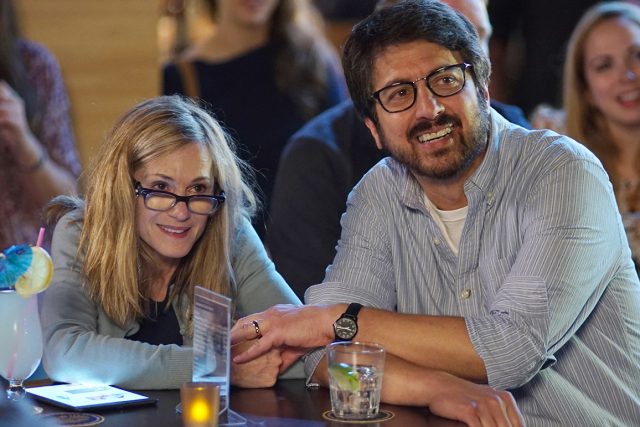Why Holly Hunter Accepted a Role in This Summer’s Indie Comedy Hit; and Why The Big Sick Tells Such an Important Story

Oscar-winner Holly Hunter is no stranger to fierce, comedic female roles. Some of her most memorable roles have showcased how comedically gifted she is when she allowed to let loose. And her role as the mother of a seriously ill daughter (played by Zoe Kazan) in the based on a true love story The Big Sick is right up there with some of her best comic performances. As Beth, the protective yet loving mother no one would want to get on the wrong-side of, she is a total scene stealer. When not being as scary as she can be on screen (including a brilliant scene she has against a heckler in a comedy club) her warmth and humor comes through when discussing her character, her costars, and the value of this feel good film.
The Interrobang: I read that you were sent a letter by the producers Judd Apatow and Barry Mendel begging you to play the role.
Holly Hunter: And Kumail. But it’s funny because I don’t really remember what was in the letter. And Kumail especially heard that and said “you don’t remember the letter, we were so careful about what to write.” But it was the people who wrote the letter that made me say yes. Judd and Barry have been associated with such ridiculously great movies. Judd directed This is 40, which is unbelievably funny. He produced Bridesmaids which is a redefinition of a movie, I don’t know what you’d even call it but I loved it. So as soon as I got the letter I knew I would take their offer seriously.
The Interrobang: Besides the people involved, what was it about the script that made you think, I get this character?
It was an excellent opportunity for me and Zoe to portray two women on screen who were cool and have a powerful connection
I also felt that when she says to Kumail, “I know who you are, our daughter’s told us all about you” I thought that was gold. That means that daughter feels safe with her parents, she likes her parents. Not just loves them, but genuinely likes being with and talking to her parents. It was an excellent opportunity for me and Zoe to portray two women on screen who were cool and have a powerful connection. And I don’t see that on screen very often. The stereotypical mother-daughter relationship is of a daughter who wants her mother to go away or stop smothering her. But in this film I felt that there was a real intimacy between them as mother and daughter and as friends.

The Interrobang: Because her character is in a coma for a big chunk of the film’s running time, we learn about that relationship through your character before we get to see the two of you interact. Did you and Zoe discuss your relationship to build a common history?
That’s the kind of dialogue I can effortlessly have with Zoe, because that’s the type of person Zoe is. I just fell in love with her immediately.
The Interrobang: And you have that sweet scene between the two of you in bed together that demonstrates how close the relationship is Beth’s been telling Kumail about.
Yeah, that scene says so much. Just the way I crawl into the bed with her and lay down. That’s the kind of dialogue I can effortlessly have with Zoe, because that’s the type of person Zoe is. I just fell in love with her immediately.
The Interrobang: You’ve been great in plenty of comedies, but in this film, most of your scenes are with two actors who came up through stand-up. Were you ever concerned that your methods as performances would be dramatically different?
Holly Hunter: When I first took the job I was very intimidated about that, but when I actually got there I wasn’t intimidated at all. Kumail and Ray are both great actors, who happen to also be really great stand-ups. And they both happen to be incredibly generous actors. But I never tried to be as funny as they are, I didn’t feel competitive and knew I never could.
The Interrobang: This is Kumail and Emily’s story, but plenty has been made about how timely and necessary a story about this type of relationship is at this time. Was that a motivating factor for you to be a part of the film?
I absolutely think the broader message is something that is crucial for people to hear, but they hear it best when it comes from the most human of conduits, the private.
Read more comedy news, stories, interviews with comedians, videos and comedy clips on our home page. Get more comedy news. Watch more viral videos. Read more interviews with the best comics in the business.
.
Latest posts by Lesley Coffin (see all)
- Can a Cartoon be a Trojan horse in Politics? Our Cartoon President Uses Lightness to Deliver Truth - June 11, 2019
- Tom Rhodes New 3 Hour Album Covers Something Pretty Big: The World - March 25, 2019
- Ari Shaffir’s Renamed Storyteller Show: An Oral History - February 19, 2019
